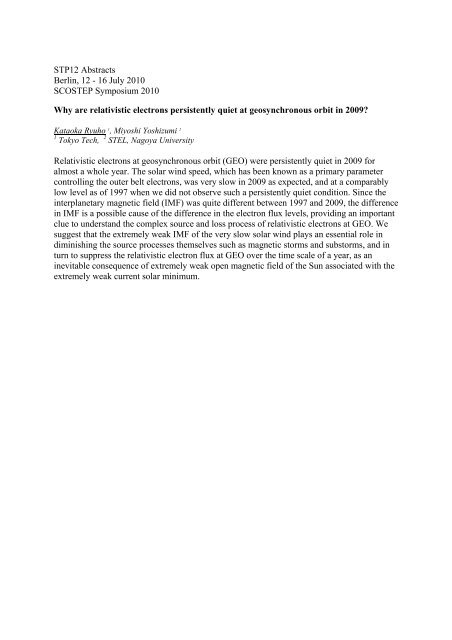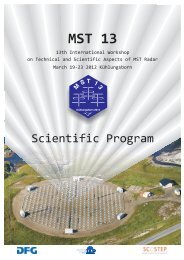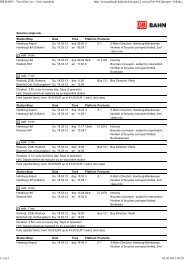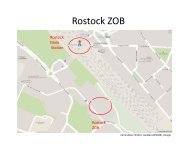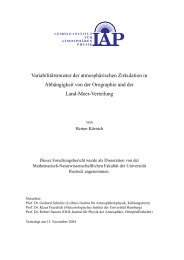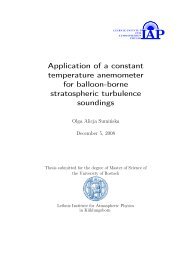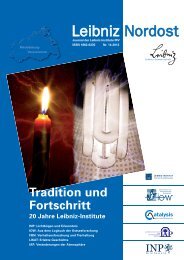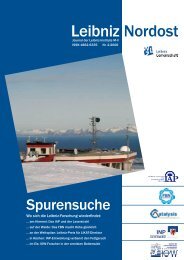- Page 1 and 2:
SCOSTEP 2010 (STP12) Berlin, 12 - 1
- Page 3 and 4:
STP12 Abstracts Berlin, 12 - 16 Jul
- Page 5 and 6:
STP12 Abstracts Berlin, 12 - 16 Jul
- Page 7 and 8:
STP12 Abstracts Berlin, 12 - 16 Jul
- Page 9 and 10:
STP12 Abstracts Berlin, 12 - 16 Jul
- Page 11 and 12:
STP12 Abstracts Berlin, 12 - 16 Jul
- Page 13 and 14:
STP12 Abstracts Berlin, 12 - 16 Jul
- Page 15 and 16:
STP12 Abstracts Berlin, 12 - 16 Jul
- Page 17 and 18:
STP12 Abstracts Berlin, 12 - 16 Jul
- Page 19 and 20:
STP12 Abstracts Berlin, 12 - 16 Jul
- Page 21 and 22:
STP12 Abstracts Berlin, 12 - 16 Jul
- Page 23 and 24:
STP12 Abstracts Berlin, 12 - 16 Jul
- Page 25 and 26:
STP12 Abstracts Berlin, 12 - 16 Jul
- Page 27 and 28:
STP12 Abstracts Berlin, 12 - 16 Jul
- Page 29 and 30:
STP12 Abstracts Berlin, 12 - 16 Jul
- Page 31 and 32:
STP12 Abstracts Berlin, 12 - 16 Jul
- Page 33 and 34:
STP12 Abstracts Berlin, 12 - 16 Jul
- Page 35 and 36:
STP12 Abstracts Berlin, 12 - 16 Jul
- Page 37 and 38:
STP12 Abstracts Berlin, 12 - 16 Jul
- Page 39 and 40:
STP12 Abstracts Berlin, 12 - 16 Jul
- Page 41 and 42:
STP12 Abstracts Berlin, 12 - 16 Jul
- Page 43 and 44:
STP12 Abstracts Berlin, 12 - 16 Jul
- Page 45 and 46:
STP12 Abstracts Berlin, 12 - 16 Jul
- Page 47 and 48:
STP12 Abstracts Berlin, 12 - 16 Jul
- Page 49 and 50:
STP12 Abstracts Berlin, 12 - 16 Jul
- Page 51 and 52:
STP12 Abstracts Berlin, 12 - 16 Jul
- Page 53 and 54: STP12 Abstracts Berlin, 12 - 16 Jul
- Page 55 and 56: STP12 Abstracts Berlin, 12 - 16 Jul
- Page 57 and 58: STP12 Abstracts Berlin, 12 - 16 Jul
- Page 59 and 60: STP12 Abstracts Berlin, 12 - 16 Jul
- Page 61 and 62: STP12 Abstracts Berlin, 12 - 16 Jul
- Page 63 and 64: STP12 Abstracts Berlin, 12 - 16 Jul
- Page 65 and 66: STP12 Abstracts Berlin, 12 - 16 Jul
- Page 67 and 68: STP12 Abstracts Berlin, 12 - 16 Jul
- Page 69 and 70: STP12 Abstracts Berlin, 12 - 16 Jul
- Page 71 and 72: STP12 Abstracts Berlin, 12 - 16 Jul
- Page 73 and 74: STP12 Abstracts Berlin, 12 - 16 Jul
- Page 75 and 76: STP12 Abstracts Berlin, 12 - 16 Jul
- Page 77 and 78: STP12 Abstracts Berlin, 12 - 16 Jul
- Page 79 and 80: STP12 Abstracts Berlin, 12 - 16 Jul
- Page 81 and 82: STP12 Abstracts Berlin, 12 - 16 Jul
- Page 83 and 84: STP12 Abstracts Berlin, 12 - 16 Jul
- Page 85 and 86: STP12 Abstracts Berlin, 12 - 16 Jul
- Page 87 and 88: STP12 Abstracts Berlin, 12 - 16 Jul
- Page 89 and 90: STP12 Abstracts Berlin, 12 - 16 Jul
- Page 91 and 92: STP12 Abstracts Berlin, 12 - 16 Jul
- Page 93 and 94: STP12 Abstracts Berlin, 12 - 16 Jul
- Page 95 and 96: STP12 Abstracts Berlin, 12 - 16 Jul
- Page 97 and 98: STP12 Abstracts Berlin, 12 - 16 Jul
- Page 99 and 100: STP12 Abstracts Berlin, 12 - 16 Jul
- Page 101 and 102: STP12 Abstracts Berlin, 12 - 16 Jul
- Page 103: STP12 Abstracts Berlin, 12 - 16 Jul
- Page 107 and 108: STP12 Abstracts Berlin, 12 - 16 Jul
- Page 109 and 110: STP12 Abstracts Berlin, 12 - 16 Jul
- Page 111 and 112: STP12 Abstracts Berlin, 12 - 16 Jul
- Page 113 and 114: STP12 Abstracts Berlin, 12 - 16 Jul
- Page 115 and 116: STP12 Abstracts Berlin, 12 - 16 Jul
- Page 117 and 118: STP12 Abstracts Berlin, 12 - 16 Jul
- Page 119 and 120: STP12 Abstracts Berlin, 12 - 16 Jul
- Page 121 and 122: STP12 Abstracts Berlin, 12 - 16 Jul
- Page 123 and 124: STP12 Abstracts Berlin, 12 - 16 Jul
- Page 125 and 126: STP12 Abstracts Berlin, 12 - 16 Jul
- Page 127 and 128: STP12 Abstracts Berlin, 12 - 16 Jul
- Page 129 and 130: STP12 Abstracts Berlin, 12 - 16 Jul
- Page 131 and 132: STP12 Abstracts Berlin, 12 - 16 Jul
- Page 133 and 134: STP12 Abstracts Berlin, 12 - 16 Jul
- Page 135 and 136: STP12 Abstracts Berlin, 12 - 16 Jul
- Page 137 and 138: STP12 Abstracts Berlin, 12 - 16 Jul
- Page 139 and 140: STP12 Abstracts Berlin, 12 - 16 Jul
- Page 141 and 142: STP12 Abstracts Berlin, 12 - 16 Jul
- Page 143 and 144: STP12 Abstracts Berlin, 12 - 16 Jul
- Page 145 and 146: STP12 Abstracts Berlin, 12 - 16 Jul
- Page 147 and 148: STP12 Abstracts Berlin, 12 - 16 Jul
- Page 149 and 150: STP12 Abstracts Berlin, 12 - 16 Jul
- Page 151 and 152: STP12 Abstracts Berlin, 12 - 16 Jul
- Page 153 and 154: STP12 Abstracts Berlin, 12 - 16 Jul
- Page 155 and 156:
STP12 Abstracts Berlin, 12 - 16 Jul
- Page 157 and 158:
STP12 Abstracts Berlin, 12 - 16 Jul
- Page 159 and 160:
STP12 Abstracts Berlin, 12 - 16 Jul
- Page 161 and 162:
STP12 Abstracts Berlin, 12 - 16 Jul
- Page 163 and 164:
STP12 Abstracts Berlin, 12 - 16 Jul
- Page 165 and 166:
STP12 Abstracts Berlin, 12 - 16 Jul
- Page 167 and 168:
STP12 Abstracts Berlin, 12 - 16 Jul
- Page 169 and 170:
STP12 Abstracts Berlin, 12 - 16 Jul
- Page 171 and 172:
STP12 Abstracts Berlin, 12 - 16 Jul
- Page 173 and 174:
STP12 Abstracts Berlin, 12 - 16 Jul
- Page 175 and 176:
STP12 Abstracts Berlin, 12 - 16 Jul
- Page 177 and 178:
STP12 Abstracts Berlin, 12 - 16 Jul
- Page 179 and 180:
STP12 Abstracts Berlin, 12 - 16 Jul
- Page 181 and 182:
STP12 Abstracts Berlin, 12 - 16 Jul
- Page 183 and 184:
STP12 Abstracts Berlin, 12 - 16 Jul
- Page 185 and 186:
STP12 Abstracts Berlin, 12 - 16 Jul
- Page 187 and 188:
STP12 Abstracts Berlin, 12 - 16 Jul
- Page 189 and 190:
STP12 Abstracts Berlin, 12 - 16 Jul
- Page 191 and 192:
STP12 Abstracts Berlin, 12 - 16 Jul
- Page 193 and 194:
STP12 Abstracts Berlin, 12 - 16 Jul
- Page 195 and 196:
STP12 Abstracts Berlin, 12 - 16 Jul
- Page 197 and 198:
STP12 Abstracts Berlin, 12 - 16 Jul
- Page 199 and 200:
STP12 Abstracts Berlin, 12 - 16 Jul
- Page 201 and 202:
STP12 Abstracts Berlin, 12 - 16 Jul
- Page 203 and 204:
STP12 Abstracts Berlin, 12 - 16 Jul
- Page 205 and 206:
STP12 Abstracts Berlin, 12 - 16 Jul
- Page 207 and 208:
STP12 Abstracts Berlin, 12 - 16 Jul
- Page 209 and 210:
STP12 Abstracts Berlin, 12 - 16 Jul
- Page 211 and 212:
STP12 Abstracts Berlin, 12 - 16 Jul
- Page 213 and 214:
STP12 Abstracts Berlin, 12 - 16 Jul
- Page 215 and 216:
STP12 Abstracts Berlin, 12 - 16 Jul
- Page 217 and 218:
STP12 Abstracts Berlin, 12 - 16 Jul
- Page 219 and 220:
STP12 Abstracts Berlin, 12 - 16 Jul
- Page 221 and 222:
STP12 Abstracts Berlin, 12 - 16 Jul
- Page 223 and 224:
STP12 Abstracts Berlin, 12 - 16 Jul
- Page 225 and 226:
STP12 Abstracts Berlin, 12 - 16 Jul
- Page 227 and 228:
STP12 Abstracts Berlin, 12 - 16 Jul
- Page 229 and 230:
STP12 Abstracts Berlin, 12 - 16 Jul
- Page 231 and 232:
STP12 Abstracts Berlin, 12 - 16 Jul
- Page 233 and 234:
STP12 Abstracts Berlin, 12 - 16 Jul
- Page 235 and 236:
STP12 Abstracts Berlin, 12 - 16 Jul
- Page 237 and 238:
STP12 Abstracts Berlin, 12 - 16 Jul
- Page 239 and 240:
STP12 Abstracts Berlin, 12 - 16 Jul
- Page 241 and 242:
STP12 Abstracts Berlin, 12 - 16 Jul
- Page 243 and 244:
STP12 Abstracts Berlin, 12 - 16 Jul
- Page 245 and 246:
STP12 Abstracts Berlin, 12 - 16 Jul
- Page 247 and 248:
STP12 Abstracts Berlin, 12 - 16 Jul
- Page 249 and 250:
STP12 Abstracts Berlin, 12 - 16 Jul
- Page 251 and 252:
STP12 Abstracts Berlin, 12 - 16 Jul
- Page 253 and 254:
STP12 Abstracts Berlin, 12 - 16 Jul
- Page 255 and 256:
STP12 Abstracts Berlin, 12 - 16 Jul
- Page 257 and 258:
STP12 Abstracts Berlin, 12 - 16 Jul
- Page 259 and 260:
STP12 Abstracts Berlin, 12 - 16 Jul
- Page 261 and 262:
STP12 Abstracts Berlin, 12 - 16 Jul
- Page 263 and 264:
STP12 Abstracts Berlin, 12 - 16 Jul
- Page 265 and 266:
STP12 Abstracts Berlin, 12 - 16 Jul
- Page 267 and 268:
STP12 Abstracts Berlin, 12 - 16 Jul


